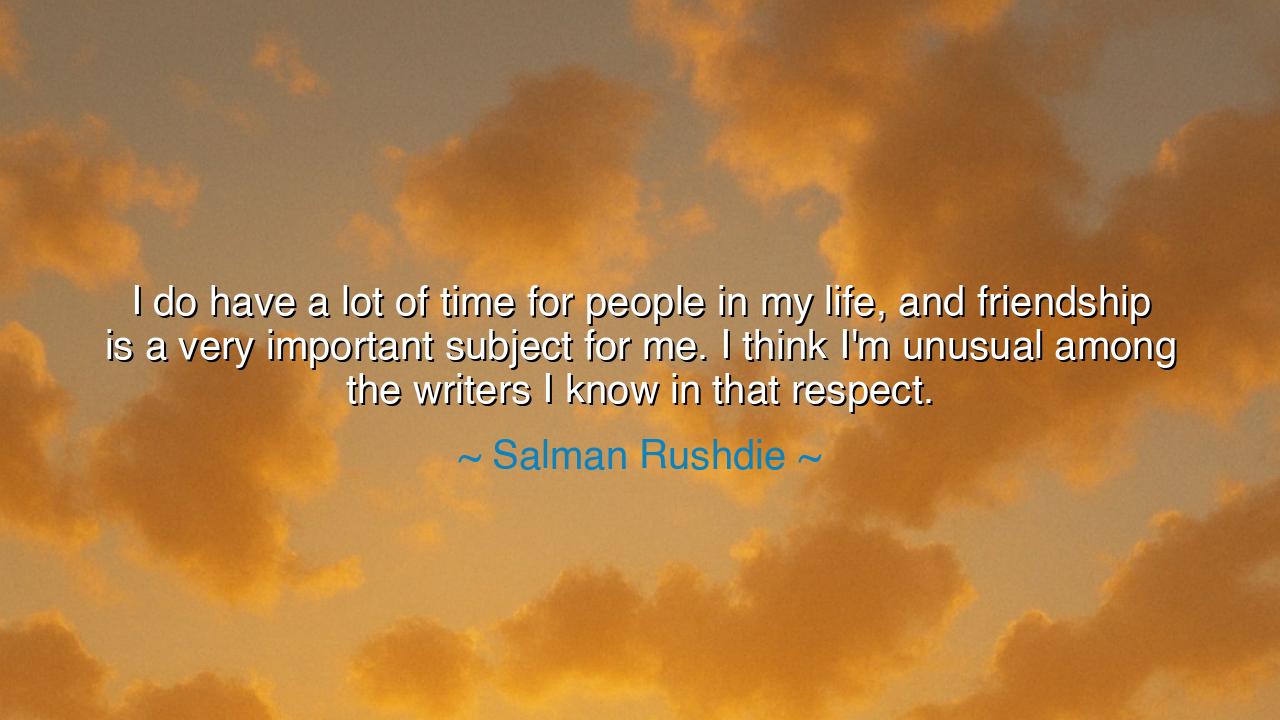
I do have a lot of time for people in my life, and friendship is
I do have a lot of time for people in my life, and friendship is a very important subject for me. I think I'm unusual among the writers I know in that respect.






“I do have a lot of time for people in my life, and friendship is a very important subject for me. I think I'm unusual among the writers I know in that respect.” — with these words, Salman Rushdie, a man whose pen has both illuminated and provoked the world, reveals something rare and tender about himself. For all the storms that have surrounded his name, this confession shines with quiet humanity. It speaks of a heart that values connection over solitude, and friendship over detachment, even in a craft that often demands distance and introspection. Rushdie reminds us that the writer, though a dweller of imagination, remains a creature of love and fellowship.
The meaning of his words unfolds on two levels — personal and universal. On one hand, Rushdie is reflecting on his own temperament: that he makes space for others, that he allows friendship to shape and sustain him. On the other hand, he contrasts himself with many of his peers — writers who withdraw into isolation, who guard their time fiercely and see companionship as a distraction from art. Rushdie’s stance is different. He sees human connection not as interference, but as inspiration. For him, friendship is not the enemy of creativity; it is its foundation. It nourishes the imagination with warmth, laughter, and truth.
The origin of this sentiment can be traced to the life Rushdie has lived — a life shadowed by exile, persecution, and resilience. When his novel The Satanic Verses provoked a global storm, he was forced into hiding, cut off from the world he loved. Yet even then, it was friendship that sustained him — the courage of those who stood by him, who opened their doors despite danger, who refused to let fear sever the bonds of loyalty. Through this crucible, Rushdie learned that friends are not a luxury, but a lifeline. His words are therefore not abstract reflection, but hard-won truth: a man learns the sacredness of friendship when the world tries to take it away.
History has shown that even the greatest minds falter without the light of companionship. Socrates, though hailed as a philosopher of reason, drew strength from his students, especially Plato, whose love and loyalty preserved the master’s words for eternity. Without friendship, Socratic wisdom might have died in the prison cell. So too did Rushdie, in his own time of confinement, discover that the greatest defense against darkness is not intellect, but the hands that reach for you when all others turn away. The friendship of the brave is the shield of the soul.
Yet Rushdie’s reflection carries a quiet challenge as well. In a world where so many chase ambition, prestige, and solitude of genius, he calls us back to something simple and ancient: to make time for people. To listen, to care, to be present. He reminds us that a person who neglects friendship may succeed in art but fail in humanity. Greatness of mind means little without greatness of heart. The unusual writer, as he calls himself, is not one who writes best, but one who remembers that life itself is the truest story — and friendship, its most enduring theme.
The lesson is clear: no matter how noble your pursuit, never grow too proud or too busy to love. Friendship is not time wasted; it is time sanctified. It teaches humility, empathy, and the joy of shared existence — virtues that no solitary genius can replace. To have time for people is to affirm that life is richer when lived together. The one who gives time to others multiplies time’s worth a thousandfold, for they build not moments, but memories that endure beyond their own breath.
In practical life, this means setting aside the rush of self-centered ambition. Make time to visit an old friend. Write a letter. Sit down for a long, unhurried meal. Share your silence as freely as your words. In doing so, you are not straying from your purpose — you are deepening it. Creativity, strength, and peace are all born from human warmth; without it, even the brightest mind grows cold.
For in the end, Rushdie’s truth stands eternal: art may give one immortality, but friendship gives life its meaning. The writer’s ink may endure on paper, but the kindness he extends endures in the hearts of others. Therefore, to future generations — cherish your craft, yes, but cherish your companions more. For no story is ever greater than the story of those who walked beside you through the journey of being alive.






AAdministratorAdministrator
Welcome, honored guests. Please leave a comment, we will respond soon